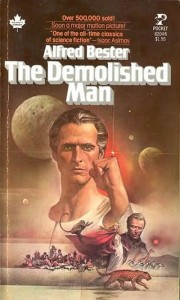 Welcome to the twelfth instalment of Dust Jacket and our first for 2012. For those of you new to the site, Dust Jacket is NCP’s ongoing column ranking and reviewing the greatest SF novels of all time. Past columns can be found at the Dust Jacket Archive
Welcome to the twelfth instalment of Dust Jacket and our first for 2012. For those of you new to the site, Dust Jacket is NCP’s ongoing column ranking and reviewing the greatest SF novels of all time. Past columns can be found at the Dust Jacket Archive
To kick off the new year, we’re delving into the realm of corporate intrigue, murder and telepathic powers with Alfred Bester’s The Demolished Man. As always, I’m joined by co-conspirator Luke, who uses his own psychic powers for evil as the World’s Harshest Critic.
One of two highly influential novels written by Bester in the 50’s, The Demolished Man holds the singular honour of being the inaugural Hugo Award winner. The books influence permeates through the SF that followed it, from the cyberpunk movement of the 80’s, to television shows like Babylon 5.
WHAT YOU NEED TO KNOW
In the 24th century, beings with telepathic powers have become an integrated and integral part of human society. Known as Espers, these telepaths are divided into three levels, dependent on power and ability. Class 3 Espers are the most common type, able to ‘read’ only conscious thoughts and serve roles as assistants and administrators. Class 2 are more powerful, able to dig into another’s pre-conscious thoughts. They serve in greater positions of power, such as lawyers and psychologists. The most powerful telepaths, the Class 1 Espers can read all conscious and subconscious thoughts and urges and serve in high ranking positions of power in the police force and the government. They also control the Esper Guild, the powerful government body designed to detect, train and enforce the ethical guidelines for the use of telepathic abilities.
The world of the Demolished Man is also one free from murder – due to the presence of telepaths it has been 70 years since the last murder was committed.
Enter, Ben Reich, the charming, highly intelligent and completely ruthless owner of Monarch Utilities and Resources. Despite his outward charm, Reich is a dangerous, paranoid psychopath whose dreams are haunted by a mysterious Man With No Face who torments and persecutes him.
Reich’s business is on the verge of bankruptcy due to its chief rival, the D’Courtney Cartel, headed by Craye D’Courtney. Reich proposes a merger, one which D’Courtney agrees to. Unfortunately, Reich’s paranoia gets the better of him and he misinterprets D’Courtney’s actions. Desperate, he plans his rival’s murder. His plan is complex and ingenious, utilising Espers to run interference for him and simple rhymes to prevent his own memories from being read.
He finally positions himself to execute D’Courtney, but at the moment he shoots, his rival’s daughter Barbara witnesses the murder. Barbara escapes, but the severe psychological shock of what she has witnessed leaves her catatonic and mute.
Police prefect Lincoln Powell, a Class 1 Esper, is called in to investigate the murder, and soon becomes embroiled in a cat and mouse game with Reich. Both seek Barbara D’Courtney, Powell to question her on what she has witnessed, and Reich to forever silence her. Reich knows that if he is caught he will subject to Demolition, the 24th Century’s harshest sentence.
WHAT WE THOUGHT
RICHO: The world of The Demolished Man is a complex and fascinating one. Bester constructs a detailedsocial structure around the core idea of telepathy and the impact it would have on society. The Class structure creates creates an interesting social divide, with the Guild at its peak. So powerful is this organisation that it even controls breeding amongst Espers to create new generations of telepaths.
Bester’s world-building is impressive. He looks at all aspects of society in constructing his depiction of a future dominated by telepaths.
LUKE: But he does it with a wry, absurdist sense of humour. Characters names, like Jo ⅟4maine and @kins, predate text speak by about fifty years. Powell’s entourage of psychic file keepers are referred to as Wynken, Blynken and Nod. In the hands of an inferior writer, this would undercut the tension and drama because it would become the focus of the writing. Bester makes these references sparingly, in an almost throw away fashion. They provide a momentary light relief while giving the audience an indicator that they are in the future.
RICHO: Into this complex, highly-structured world enters Ben Reich, one of SF’s most fascinating protagonists. Reich is enigmatic, charming and completely ruthless in his desire for power. He is highly intelligent, manipulative and cunning. He will stop at nothing to achieve his goals. His personal motto – “Make your enemies by choice, not by accident” – perfectly illustrates his ruthless, uncompromising, obsessive personality.
Underlying this, however, is deep psychoses and paranoia. These psychoses lead Reich to misinterpret D’Courtney’s merger offer and leads him down his most ambitious path to date – the murder of his rival and consolidation of his power through this act. The fact that the existence of Espers has ensured that no murder has been committed in 70 years just feeds Reich’s ambition, and his plan is nothing short of brilliant. It is in the execution of this crime and his subsequent attempts to hide his guilt and allay suspicion that we truly see thedepths of Reich’s ruthlessness and cunning.
LUKE: It’s his ambition and his drive that are most compelling. This is a world regulated by people with telepathic powers. Yet this man (wealthy, influential and cunning to be sure) has dared to stand against them, a human about to face a world of superhumans. Indeed, he uses their own methods against them. He has a deep seated human need to want, in-spite of the luxurious nature of his life. It doesn’t make him likeable, but there is something about him with which we can identify. And yet even he’s blind to why he’s really doing what he’s doing. He’s unwilling to face certain aspects about himself and the murder that become personified in his dreams and visions of the Man With No Face- a metaphor, as is revealed later and is key to his undoing, for his conscience.
RICHO: Of course, for the story to be truly effective, Reich needs a foil, an intellectual equal to challenge him. Bester delivers in fine style with the introduction of Police Prefect Lincoln Powell into the story. Powell is a Class 1 telepath, believed to be next in line to the Presidency of the Esper Guild. He is the chief investigator in D’Courtney’s murder, a brilliant mind that serves as the perfect antagonist to Reich and his ambitions.
LUKE: But he’s also cocky. His initial Rough Tail is defeated because he believes Reich will become overconfident, and therefore play into his hands. What he doesn’t count on is Reich’s ruthlessness or intellect. To a certain degree, Powell’s in over his head because there hasn’t been a murder committed in decades. In previous cases, Powell probably matched wits with people he was always a few steps ahead of. Reich, however, is brilliant. Powell isn’t used to dealing with that. Also, he knows that Old Man Mose, the ruling computer arbitrating on his case, needs hard evidence. And he’s hamstrung by the guild’s regulations. Out go the old methods. In comes an even older and somewhat truer method: old fashioned detective work.
Powell has to start talking to people. More importantly he has to learn to get people to open up, which means needing to open up himself and make connections with people, not just on intellectual level, but on an emotional level as well. If Reich’s story is about a human committing an inhuman act, Powell’s story is about a superhuman becoming more in touch with his humanity.
RICHO: Without a doubt, the highlight of The Demolished Man is the cat and mouse game of flight and pursuit that Reich and Powell become embroiled in. Reich and Powell are both attempting to overcome the limitations and expectations of their society, and both feel the pressure imposed by that society. There is an air of mutual respect and even understanding between them, as is common amongst the best literary rivalries.
LUKE: It’s not just a highlight. It’s the back bone of the entire story. Committing the murder isn’t Reich’s primary goal; it’s getting away with it. Solving the murder isn’t Powell’s primary goal; it’s proving that Reich committed it. Immediately, we have the foundation for it was essentially a basic point of conflict (character A wants something, character B wants to stop him from getting it). But what makes it compelling is that it’s not just two masterminds in their respective fields trying to outwit one another. Upon their first meeting, Powell is struck by Reich’s tremendous aura of charm and power. There was kindliness in that power, but it was corroded by the habit of tyranny. Towards the end of chapter 6, Powell even admits that he wants to destroy the killer in Reich because he admires the saint in him. Reich himself sees in Powell not a figure of authority or champion of the status quo, but a reflection. “We’ve got honour in us, but it’s our own code…not the make-believe rules some frightened little man wrote for the rest of the frightened little men.” Powell even tries to plead with Reich to give himself up, and gets angry when Reich refuses to give up the best fight of his life. This leads to what I believe are the five finest lines in the entire novel:
“I lost a great partner in you,” Reich said.
“You lost a great man in yourself, Ben.”
“Enemies?”
“Enemies.”
It was the beginning of Demolition.
Powell and Reich find much to respect, admire, even love (there is a hint of homoeroticism to their relationship, particularly in their final confrontation) about each other. In another world, these men could’ve been great friends
RICHO: The threat that looms over Reich is Demolition. At first, it is merely a word, an implied danger that Reich faces. Slowly, steadily, as Reich becomes more deeply embroiled in murder, Bester reveals the nature of demolition. It’s a fascinating revelation that highlights the nature of the telepathic society Bester has created, and one that shouldn’t be spoiled for readers.
LUKE: Reich’s journey ends with a coda that not only highlights the nature of Bester’s world but makesa none too subtle dig at capital punishment in the fifties. Poignant stuff, from the heart of the McCarthy Era.
RICHO: The Demolished Man is a brilliant novel, one of SF finest novels. Bester presents not only a complex world, but complex characters that are both reflections of and rebellions against that world. While most critics and fans list The Stars My Destination as Bester’s greatest work, I personally rank this this novel higher. 5 Lukes.
LUKE: For me, The Stars My Destination is the classic. But this is a very close second. 4.5 Lukes.
WHAT DO YOU THINK?
It seems that we’re in agreement that The Demolished Man is one of the true masterpieces of SF. Are we crazy? Let us know what you think in the comments section below.
THE RANKING
The Demolished Man joins Ringworld at the top of the list, vying for the title of greatest SF novel of all time!
1. Ringworld – Larry Niven – 4.75
1. The Demolished Man – Alfred Bester – 4.75
2. Foundation series – Isaac Asimov – 4.5
2. The Forever War – Joe Haldeman – 4.5
3. The City and the Stars – Arthur C. Clarke – 4
4. Non-Stop – Brian Aldiss – 3.5
5. Player of Games – Ian M. Banks – 3.25
6. The Hundred Thousand Kingdoms – N.K. Jemisin – 3
7. Cryoburn – Lois McMaster Bujold – 2.25
8. Blackout – Connie Willis – 2
9. The Dervish House – Ian McDonald – 1.5
10. Feed – Mira Grant – 0.5
BEHOLD…THE FUTURE!
Join us in two weeks as we turn our minds back to the heady days of the late 19th century and journey into the far future with a look at H.G. Well’s 1895 classic The Time Machine.








